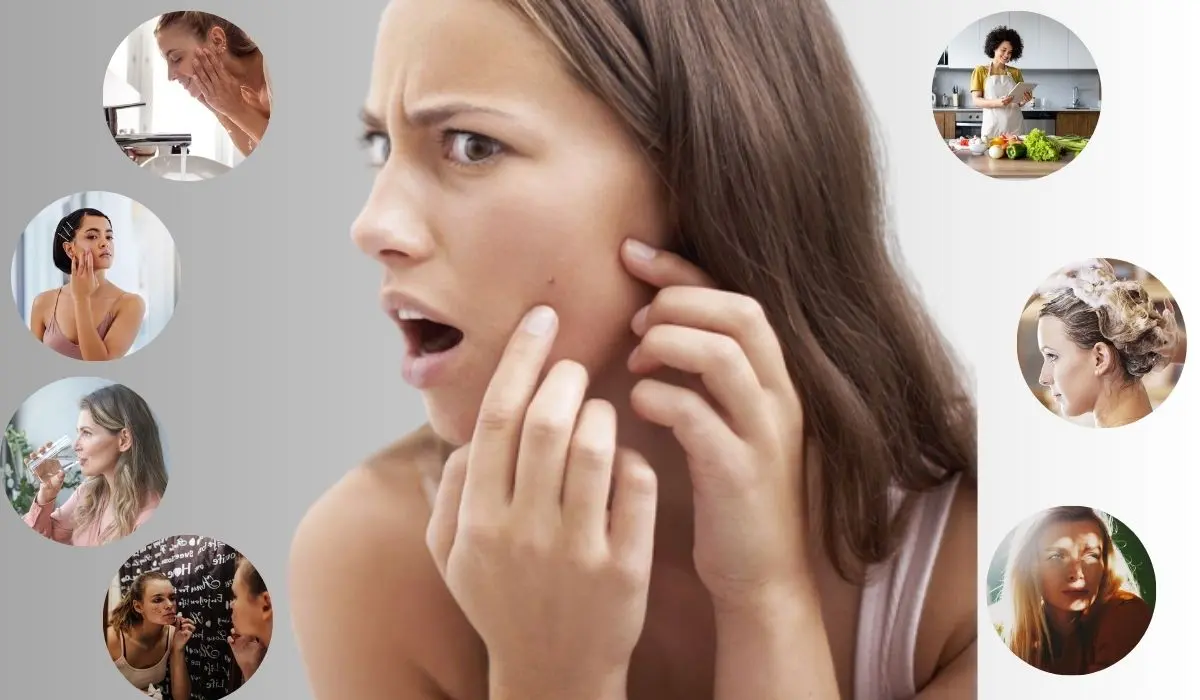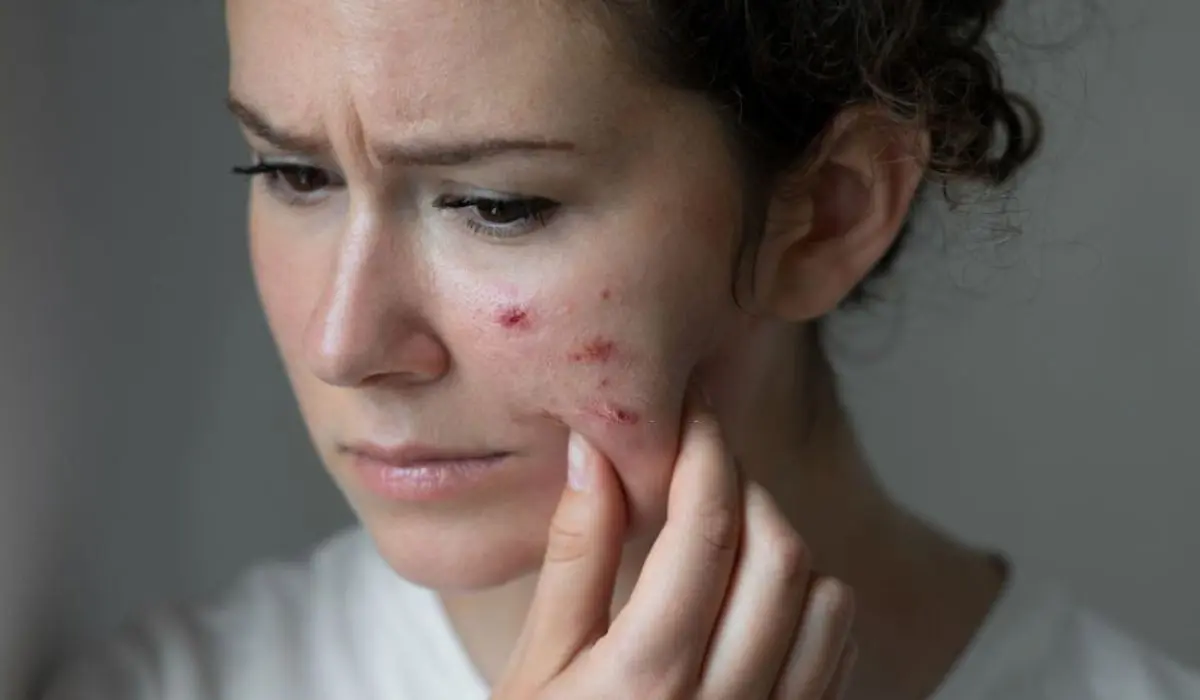Millions of people suffer from acne, a skin condition that is common and can be physically and psychologically distressing.
While hormones, genetics, and skincare practices all contribute to the development of acne, recent evidence points to a direct correlation between gut health and acne.
Acne develops when too many skin cells line inside a hair follicle, preventing sebum from being evacuated. As a result, your body’s immune system produces an inflammatory reaction, allowing germs to flourish.
It’s interesting to note that over 70% of your body’s immune cells are found in your gut, where the gut microbiome has an impact on them.
In this article, we’ll explore the role of gut health in developing acne and how to improve gut health to have better skin.
Gut Microbiome And Acne: Exploring The Link
The term “microbiome” refers to a group of microorganisms that live in a given environment, particularly those that reside inside or on the human body.
Research is now showing that each person’s particular microbiome affects their ability to regulate their immune system, hormones, and metabolism.
The interaction between host immunity and skin microorganisms significantly influences the development of acne. The majority of the microorganisms found on the skin are mild and coexist in symbiosis with host cells.
A growing number of studies link the conditions of the intestines to skin health, suggesting that the gut microbiome may also have a vital role in acne formation.
Acne and gut health are correlated with the composition of the intestinal microbiomes.

The billions of microorganisms that make up the gut microbiota are essential for regulating many body processes, including immune response and inflammation, and for sustaining overall health.
A disruption in the proper balance of gut microbiomes can cause systemic inflammation and could cause or aggravate skin disorders like acne.
According to research, people with acne typically have an unbalanced gut microbiome compared to others with clear skin.
Increased intestinal permeability or “leaky gut,” caused by dysbiosis, an imbalance in the composition of the gut bacteria. It can let toxins and other harmful substances enter the bloodstream.
This condition initiates an inflammatory reaction that can lead to acne or intensify the existing breakouts.
Additionally, some types of gut bacteria create short-chain fatty acids (SCFAs), which have anti-inflammatory effects and support immune function balance.
These SCFA-producing bacteria can produce an imbalance that can lead to skin problems and irritation.
Keeping the gut microbiome balanced is essential for lowering inflammation and promoting good skin health.
Strategies And Tips To Remove Acne
Although acne might not be a substantial health issue, it does have a huge emotional and social impact.
Acne frequently causes a person to feel less confident, which may affect their social life or even their productivity at work.
Anyone who has struggled with persistent acne is aware of how difficult it can be to get your skin to recover.
However, you can opt for several methods to stop new ones from developing while still attempting to treat the existing pimples.
You can reduce your breakouts and work to maintain the healthiest possible skin while there isn’t a certain technique to get rid of acne.

Read on for some effective strategies and tips that help you to prevent pimples and make your skin clean.
- Wash Your Face Properly
Acne on the face is more common although it can appear elsewhere on the skin.
Despite the complexity of the skin microbiome, researchers have discovered a bacterium called Propionibacterium acnes that can result in breakouts of acne.
These bacteria produce fatty acids from sebum, the skin’s natural oil, which causes inflammation.
Daily cleansing can help prevent acne by removing excess oil, sweat, and dirt, but overwashing your face may worsen acne.
Go for a mild, non-abrasive cleanser. Apply it with your fingertips to avoid irritating your skin by scrubbing with sponges, cloths, or other cleaning tools.
- Choose Suitable Skincare
Use skincare items that are mild and have “alcohol-free’ on the label. Avoid using astringents, toners, and exfoliants, as these can irritate your skin and worsen acne.
Knowing the type of your skin might help you choose which cosmetics to use and which to avoid.
Persons with oily skin are typically prone to acne, but anyone can develop pimples. Understanding your skin types might make it simpler to select an acne program that will help your skin clean up.
- Stay Hydrated
Your body may instruct the oil glands in the skin to create extra oil if you are dehydrated. In addition to making your skin look lifeless, dehydration encourages inflammation and discoloration.
It is better to consume eight glasses of water or more each day to keep your body well-hydrated.
- Keep Your Hands Off
Touching your face frequently might make acne worse. Tempting, picking, popping, or squeezing your acne will take longer to heal up and raise your risk for post-inflammatory hyperpigmentation, which causes dark spots and discoloration.
Additionally, keep your hands clean, and wash them frequently with soap and warm water, especially after eating.
- Follow A Healthy Diet
A study that recently appeared in the Journal of the American Academy of Dermatology reveals that consuming fewer sugary items and carbohydrates reduces breakouts, even though there is no scientific evidence to support the claim that chocolate and oily meals worsen acne.
Eating an adequate diet seems to be a good idea to keep your skin away from acne, and it may also help keep your skin clear.
- Wash Your Hair More Often
It is better to wash your hair more frequently. Breakouts on the forehead and face can be avoided by keeping hair clean and away from your face.
Some hair products, such as gels and pomades, may make acne worse. Therefore, if you frequently use hair products and have acne on your forehead, you might want to stop. Forehead-covering headbands can also worsen acne by keeping sweat in place.
- Limit Sun Exposure
Tanning harms your skin and can make acne worse in addition to raising your risk of skin cancer. Some anti-acne products might also make your skin extremely sensitive to harmful ultraviolet rays.
Your skin may be protected all year long by wearing sunscreen. Sunscreens frequently have a greasy consistency. Choose a non-comedogenic, oil-free sunscreen for protection from the sun and acne.
Gut-Healing Foods For Clearer Skin
Along with 300-500 different varieties of bacteria, your gut is home to the majority of your immune system.
Certain foods can cause gut inflammation and make it easier for harmful bacteria to flourish in the gut, both of which may cause skin issues like acne.
If you keep your gut healthy, you can have skin with less acne and other similar issues. But do you know which foods are considered gut-healing?
Gut health greatly benefits from the fiber in greens like broccoli, spinach, and kale. Fermented foods like kraut, kombucha, and kefir can help the gut become populated with beneficial bacteria.

Fish, almonds, and bone broth are examples of foods high in omega-3 fatty acids that are also beneficial for the digestive system.
Prebiotics are a form of fiber that helps the growth of healthy bacteria in your intestines while not being fully digested there.
Some foods that contain this compound include artichokes, chickpeas, asparagus, red kidney beans, and cashews.
Additionally, you can take supplements like probiotics, glutamine, or zinc. Topical probiotics and creams that contain lactic acids can help reduce skin irritation which leads to acne, as your skin has its microbiome.
Lifestyle Changes For Better Gut Health And Reduced Acne
An unhealthy gut can cause several problems such as diarrhea, abdominal pain, acidity, nausea, constipation, weight gain or weight loss, and acne.
According to several pieces of research, lifestyle has a great influence on maintaining one’s gut health.
Having a healthy gut might reduce your problems with your skin. So, let’s see the changes that need to be applied in our lifestyle to get better gut health and reduced acne.
- Include yoga and meditation to relax the body because stress might harm your digestive system.
- Add workouts and a healthy diet to your daily regimen.
- Choose foods that are fermented and probiotics to reduce stomach inflammation.
- Drink plenty of water to maintain your body hydrated and to support digestive health.
- Avoid consuming excessive amounts of sugar.
- Eat fruits, vegetables, sprouts, legumes, and whole grains that are high in fiber.
- Reduce consumption of things that can upset your gut’s delicate balance, such as alcohol, junk food, and smoking.
- Avoid eating anything with artificial sweeteners, flavors, or colorings.
Promoting Healthy Digestion For Acne Free Skin
Your digestive system is the key to having clearer skin. Our digestive system’s operation starts to make a lot of sense if we take a closer look at it.
The digestive system serves a variety of purposes but is mostly responsible for helping us absorb nutrients from meals. Additionally, it is the main cause of our body’s inflammation, which can seriously damage the skin.

Breakouts, dermatitis, redness, and dull skin might result from a digestive system that isn’t functioning properly. According to extensive studies, many of these inflammations are undoubtedly caused by poor digestion.
The best thing you can do to have healthy digestion for acne-free skin is to follow a balanced diet with fermented foods that are high in probiotics since it includes a variety of species and strains.
Final Thoughts
Remember, your gut is where clearing up your skin begins. So if you’ve tried every topical medication available but are still having acne issues, try looking inward and putting more of an emphasis on keeping your digestive system healthy.
Include dietary changes in your daily regime to have clear skin. Consult a doctor if your acne concerns you even after taking care of your gut.
FAQ
- Can gut health affect skin acne?
Yes, if you have an unhealthy gut, it will definitely affect skin acne.
- How is gut health related to skin issues?
A disruption in the proper balance of gut microbiomes can cause systemic inflammation and could cause or aggravate skin disorders like acne.
- Which gut bacteria can cause acne?
A gut bacterium called Propionibacterium acnes that flourish in human skin can result in breakouts of acne.
- How do you heal gut health for clearer skin?
You can heal gut health by taking appropriate probiotics and prebiotics foods and supplements.
- What are the signs of poor gut health?
Frequent discomfort, diarrhea, bloating, gas, diarrhea, constipation, skin inflammation, and heartburn could be the signs that show your guts is in poor condition.

